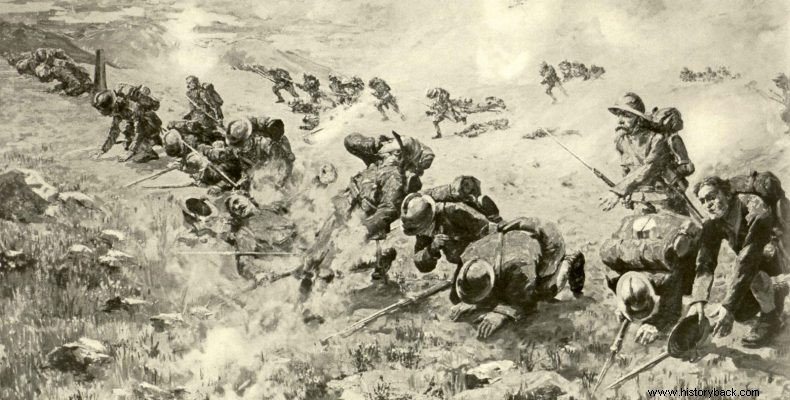
The story of a major military offensive that took place in September 1918 in the Vora mountain range and subsequently led to the end of the First World War, is coming back to the fore these days, as this year marks the 104th anniversary of those crucial battles. It was in the middle of September, when Greek, Serbian and French allied forces managed to "break" the front of Bulgarians, Austrians and Germans, with the help of the critical interventions of the detachment of the Greek Colonel Panagiotis Gargalides, north of Promachi.
SOURCE:APE-ME
The APE - BPE presents the events that took place and describes the way in which the 35th Regiment of Gargalides moved decisively into the enemy's main line of defense. According to the first volume of the publication "35th Regiment, Excerpt Gargalidis, This is how the front broke" by the historical researcher Nikolas Efthimiou for the DobroPolie Heroes Trail, with the main sources being the French archives of the Army of the East, the memoirs of generals Daglis and Mazarakis and the "Balkanikos Thachydromos" newspaper, "Gargalidis moved on Chlem Kukuruz - Golio Bilio and from there west to Veternik and then east to Golio Bilio and Preslap".
Mr. Efthimiou reports to APE-MPE that the battles against the enemy positions had started in the area in the early hours of September 15, 1918. The Gargalidis Detachment, as the Greek forces were then considered by the allies to be inexperienced, was under the command of two French Officers:Colonel Rondeau who commanded the Hexaplatano group and Lieutenant Colonel Roy who commanded the detachment of the same name. Gargalidis asked Colonel Rondeau and the French general Josef d'Anselme to take command of the Regiment himself, which he finally succeeded.
During the military operations and while the allied Serbian troops came under enemy fire and suffered defeats, Gargalidis made a request to conduct small-scale diversionary attacks. The request was accepted and after the neutralization of enemy positions the Serbian division returned to its original positions. Advancing, and after four hours of hard fighting, the detachment captured a hill of great strategic importance at the foot of Chlem Kukuruz, where the Germans had established an observation post that watched over almost the entire battlefield and directed the artillery fire. That same night, the Greek force continued its march and decided to attack the Bulgarian positions, with a surprise attack at dawn, without artillery support from the allied forces.
Nikolas Efthymiou characteristically points out that "Colonel Rondeau contacted Colonel Gargalidis by telephone and asked him to do the impossible:that is, with one of his two Battalions (in fact with two Companies, where one and a half Regiments had failed), to continue the attack towards Zborsko, Preslap, leaving the other Battalion in defensive formation by one Company".
He explained to him, in fact, that "this mission would be very dangerous, almost suicidal, since no help could be given to the Constitution, which could be easily isolated and destroyed, due to its isolation and dispersion in case of enemy attack." counterattack". He emphasized, at the same time, that "this operation would be of great service to the Allied struggle".
Finally, the two Greek Battalions launched the attack and captured the entire complex of Preslap, causing the immediate retreat of the enemy from their defensive positions. The front was now broken on the morning of September 16, the second day of the attack. For this action, the Greek colonel Panagiotis Gargalidis was decorated directly on the battlefield with the French Military Cross by his Commander, French General Josef d'Anselme. In the following days he was awarded the highest French decoration of the Legion of Honor by the Commander-in-Chief of the Allied Forces Franchet d'Esperey.
The importance of these events was underlined, speaking to APE-MPE, by the associate professor of the Department of Balkan, Slavic and Oriental Studies at the University of Macedonia Vlasis Vlasidis, pointing out that the great attack in September 1918 had the effect of "breaking" the front and retreat the Bulgarian forces, with positive consequences of historical importance for ending the war in a short period of time.
Some, however, of these forts no longer exist to tell their story as it has recently been found that strangers had burnt, dismantled and destroyed some of the forts, either probably in search of valuables, or because they wished to destroy anything that suggested a foreign presence .
The interest, however, of the Municipality of Edessa in an effort to promote and highlight the area is real, while efforts are being made to mark and highlight the forts, in the context of the goal of promoting the historical past of the place and the cultural product of today.
